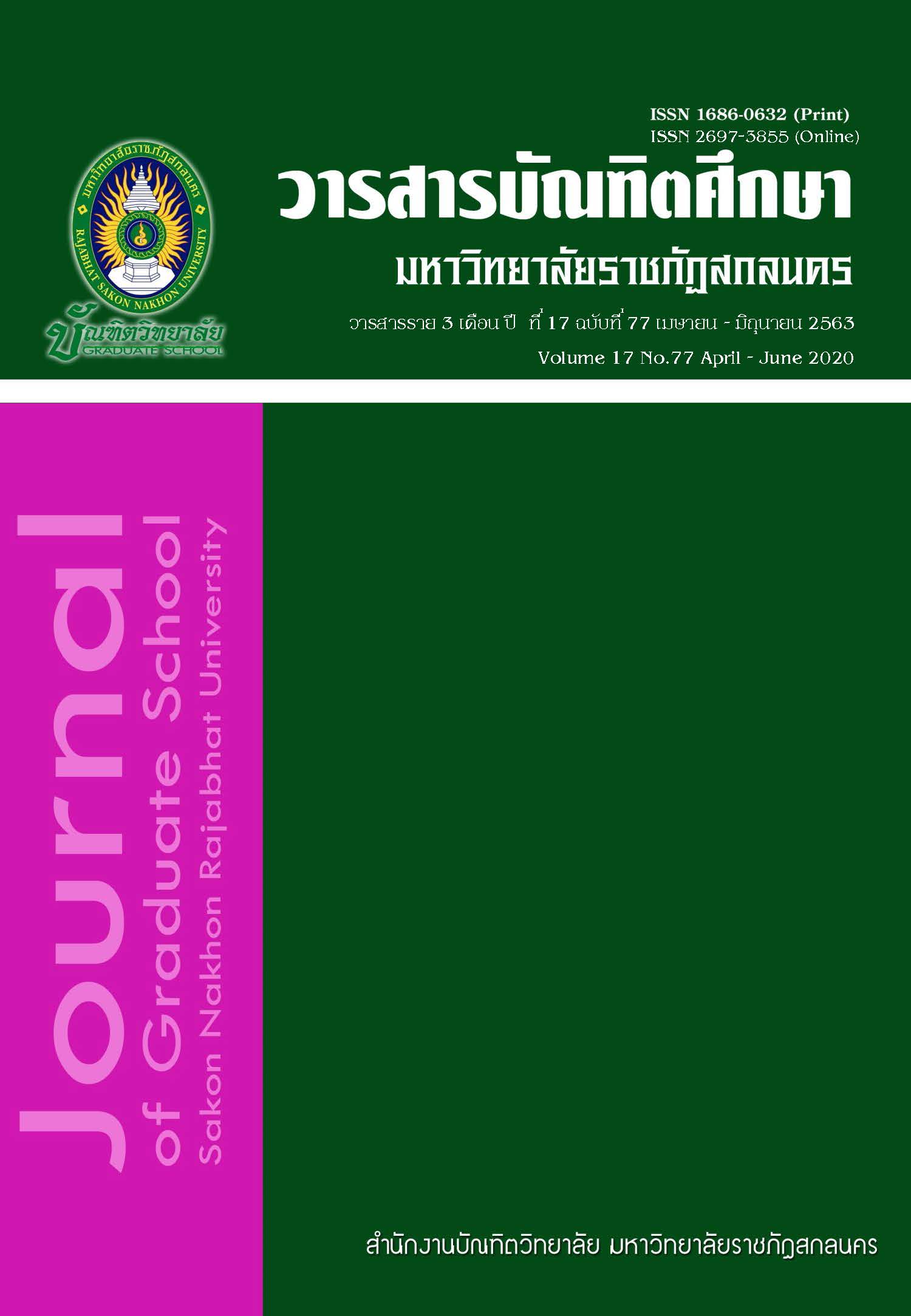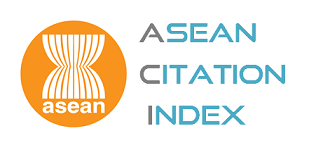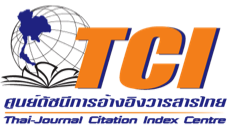การพัฒนาความฉลาดทางอารมณ์ด้วยกิจกรรมจิตตปัญญาศึกษาสำหรับชั้นมัธยมศึกษาปีที่ 1
Keywords:
Emotional Quotient, Contemplative Education, Contemplative Education ActivitiesAbstract
การศึกษาค้นคว้าครั้งนี้มีความมุ่งหมาย 1) เพื่อพัฒนากิจกรรมจิตตปัญญาศึกษาในการพัฒนาความฉลาดทางอารมณ์สำหรับนักเรียนระดับชั้นมัธยมศึกษาปีที่ 1 2) เพื่อเปรียบเทียบผลความฉลาดทางอารมณ์ของนักเรียนที่เข้าร่วมกิจกรรมจิตตปัญญาศึกษาก่อนการทดลองและหลังการทดลอง และ 3) เพื่อศึกษาผลการพัฒนาความฉลาดทางอารมณ์ของนักเรียนระดับชั้นมัธยมศึกษาปีที่ 1
ด้วยกิจกรรมจิตตปัญญาศึกษา กลุ่มตัวอย่างที่ใช้ในการศึกษาค้นคว้าครั้งนี้ คือ เป็นนักเรียนชั้นมัธยมศึกษาปีที่ 1/10 โรงเรียน
ธาตุนารายณ์วิทยา อำเภอเมือง จังหวัดสกลนคร ภาคเรียนที่ 1 ปีการศึกษา 2561 จำนวน 20 คน ซึ่งได้มาโดยการสุ่มอย่างง่าย (Sample Random Sampling) ใช้เวลาทดลอง ภาคเรียนที่ 1 ปีการศึกษา 2561 เครื่องมือที่ใช้ในการศึกษามี 3 ชนิด คือ 1) แผนกิจกรรมจิตตปัญญาศึกษาในการพัฒนาความฉลาดทางอารมณ์, 2) แบบประเมินความฉลาดทางอารมณ์, และ 3) แบบบันทึกการเขียนอนุทินของนักเรียน สถิติที่ใช้ในการวิเคราะห์ข้อมูล คือ ค่าเฉลี่ย ส่วนเบี่ยงเบนมาตรฐาน และ T-test Paired Samples Test
ผลการวิจัย พบว่า
- กิจกรรมจิตตปัญญาศึกษาในการพัฒนาความฉลาดทางอารมณ์สำหรับนักเรียนระดับชั้นมัธยมศึกษาปีที่ 1 ประกอบด้วย กระบวนการเรียนรู้ 3 ลักษณะ คือ 1) การรับรู้อย่างลึกซึ้ง (Deep sensing) 2) การน้อมสู่ใจอย่างใคร่ครวญ (Contemplation)
3) การเฝ้ามองเห็นตามที่เป็นจริง (Meditation) โดยมีผลการประเมิน ในระดับ เหมาะสมมากที่สุด ค่าเฉลี่ยเท่ากับ 4.565 - การเปรียบเทียบความแตกต่างของกลุ่มทดลองระหว่างก่อนและหลังการเข้าร่วมกระบวนการจิตตปัญญาศึกษา พบว่า กลุ่มทดลองมีคะแนนเฉลี่ยความฉลาดทางอารมณ์หลังทดลองสูงขึ้นอย่างมีนัยสำคัญทางสถิติที่ระดับ .05 ทั้ง 3 ด้าน คือ ด้านเก่ง ด้านดี และด้านมีความสุข
3. นักเรียนระดับชั้นมัธยมศึกษาปีที่ 1 หลังเข้าร่วมกิจกรรมจิตตปัญญาศึกษา เกิดการเปลี่ยนแปลงขั้นพื้นฐานในตนเอง ในการพัฒนาความฉลาดทางอารมณ์ โดยนักเรียนเกิดความรู้ ความเข้าใจ และข้อเท็จจริงเกี่ยวกับความหมายและลักษณะของผู้มีความฉลาดทางอารมณ์ สามารถตัดสินใจแก้ปัญหาและแสดงออกได้อย่างมีประสิทธิภาพ ตลอดจนมีสัมพันธภาพที่ดีกับผู้อื่น และสามารถสร้างความสุขสงบทางใจให้เกิดกับตนเองได้
References
นครปฐม: เอส.พี.เอ็น.การพิมพ์.
ปิยะวรรณ เลิศพานิช. (2547). การพัฒนารูปแบบการพัฒนา เชาว์อารมณ์แบบผสมผสาน. วิทยานิพนธ์ครุศาสตรดุษฎี บัณฑิต
สาขาจิตวิทยาการศึกษา. บัณฑิตวิทยาลัย. จุฬาลงกรณ์มหาวิทยาลัย.
พระธรรมปิฎก. (2543). เจตโกศลหรือปรีชาเชิงอารมณ์ (emotional intelligence). กรุงเทพฯ: กระแสวัฒนธรรม.
วิจารณ์ พานิช. (2558). เรียนรู้สู่การเปลี่ยนแปลง. มูลนิธิสยามกัมมาจล.
วิทยากร เชียงกูล (2552). จิตวิทยาและการพัฒนาตนเอง. กรุงเทพฯ: สำนักพิมพ์สายธาร
หิมพรรณ รักแต่งาม. (2551). การศึกษาวิเคราะห์การตีความหลักธรรมทางพระพุทธศาสนา ของติช นัท ฮันห์.
วิทยานิพนธ์ปริญญาดุษฎีบัณฑิต. กรุงเทพฯ: มหาจุฬาลงกรณราชวิทยาลัย.
สมสิทธิ์ อัสดรนิธี. (2556). การแสวงหาความรู้แบบจิตตปัญญศึกษา. กรุงเทพฯ: วีพริ้นท์.
สำนักงานกองทุนสนับสนุนการสร้างเสริมสุขภาพ. (2561). คู่มือพัฒนาทักษะสมอง EF-Executive Functions ในเด็กวัย 13-18 ปี.
กรุงเทพฯ : บริษัทรักลูกกรุ๊ป จำกัด.
อุมาพร ตรังคสมบัติ. (2559). สร้างวินัยให้ลูกคุณ. กรุงเทพฯ: ซันต้าการพิมพ์.
Calhoun, C.,Light, D.,& Keller,S.(1994). Sociology. New York: McGraw-Hill.
Goleman, D. (1995). Emotional intelligence. New York: Bantam Books.
Goleman, D. (1998). Working with emotional intelligence. New York: Bantam Books.
Taylor, E. (1998). Transformative learning: A critical review. ERIC Clearinghouse on Adult, Career, and Vocationnal
Education (Information Series No.374)
Mayers, D.G. (1992). Psychology. New York: Worth Publishers.
York,L.} & Kasl, E. (2002). Toward a theory and practice for whole-person learning: Reconceptualizing experience
and the role of affect. Adult Education Quarterly, 52(3), 176-192
Downloads
Published
How to Cite
Issue
Section
License
บทความทุกบทความที่ตีพิมพ์ในวารสารบัณฑิตศึกษา มหาวิทยาลัยราชภัฏสกลนคร ถือว่าเป็นลิขสิทธิ์ของบัณฑิตวิทยาลัย มหาวิทยาลัยราชภัฏสกลนคร










